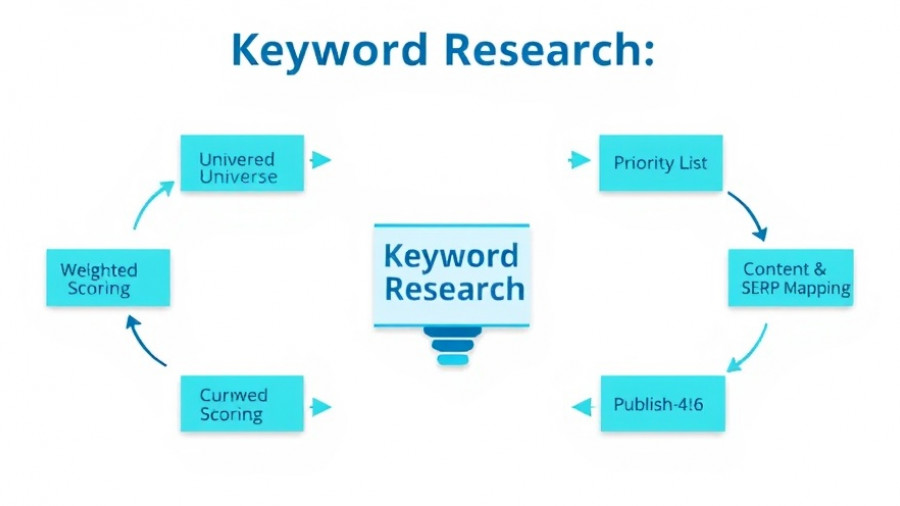
Unlocking the Secrets of Effective Keyword Research
In the ever-evolving landscape of digital marketing, finding the right keywords is crucial for driving traffic and conversions. No longer can businesses rely on luck or outdated strategies; instead, they must adopt a data-driven approach that aligns their SEO efforts with user intent and behavior. Leveraging a systematic framework can help you build a robust SEO strategy that not only enhances visibility but also supports business growth.
The Five-Step Framework to Improve Your Keyword Strategy
The process of selecting the best keywords begins with a clear understanding of your business goals and the metrics that matter. Here’s a detailed breakdown of a five-step framework for effective keyword research:
Define Measurable Outcomes and Constraints
Before diving into keyword selection, it’s vital to define what success looks like for your team. Is it increasing demo requests, driving self-service signups, or generating qualified leads? By clarifying constraints such as available resources and targeting parameters, you ensure that your keyword strategy is not just based on search volume but is also aligned with your business objectives.
Build Your Total Keyword Universe
Gather seed keywords from various sources, including customer insights, sales calls, and competitor analyses. Expand upon this base using tools like Google Keyword Planner and inquiry data from Google Search Console. Additionally, explore channel-specific keywords by monitoring social media platforms such as TikTok, YouTube, and LinkedIn, where your audience engages in discussions relevant to your products or services. This approach helps paint a comprehensive picture of the language your potential customers use, which can unlock valuable insights.
Score and Prioritize with a Weighted Model
Once you’ve compiled a vast list of potential keywords, prioritize them based on several factors, including search volume, keyword difficulty, and intent. Keywords that align closely with your target audience’s purchasing decisions typically yield better conversion rates. For instance, high-intent phrases like “best [product] for [specific need]” are often more valuable than broad queries.
Map Keywords to Content and Funnel Stages
Not all keywords are created equal; they serve different purposes at various stages of the customer journey. It’s essential to categorize your keywords according to the buyer’s journey—awareness, consideration, and decision-making. This will help you create targeted content that resonates with your audience’s needs at each stage. Moreover, consider incorporating keywords that highlight specific SERP features, such as featured snippets, to maximize visibility.
Publish, Measure, and Iterate
Your keyword strategy should be flexible enough to adapt to outcomes. After publishing content, closely monitor performance metrics through tools like Google Analytics to glean insights about user behavior. This data-driven approach allows for quick adjustments to your strategy based on real-time feedback, ensuring continuous optimization and relevance.
Data-Driven Insights: The Heartbeat of Modern SEO
Incorporating data into every step of your keyword research and SEO strategy is non-negotiable in today’s digital market. The emphasis should be on understanding user intent and behavior through analytics. For instance, studies show that 70% of consumers prefer personalized experiences, which your keyword strategy can effectively provide by aligning with expected search patterns and emerging trends.
The Importance of AI and Analytics in Keyword Research
Artificial intelligence is reshaping the way businesses approach keyword research. Tools powered by AI analyze vast amounts of data to identify keyword opportunities that traditional methods might miss. For example, AI algorithms can suggest keywords based on trending search queries, user behavior patterns, and even competitor tracking. By leveraging advanced analytics, businesses can create a more dynamic and responsive SEO strategy.
Conclusion: Taking Action with Your Keyword Strategy
Marketing professionals and business owners must prioritize a data-driven keyword research strategy that not only adapts to current search engine algorithms but also resonates with users. As digital marketing continues to evolve, staying ahead means consistently refining your keyword approach. So start optimizing your keywords now; your future success depends on it. Remember, if you want to crush your digital marketing goals, schedule a FREE consultation to review your current keyword strategy and unlock your business's full potential!
 Add Row
Add Row  Add
Add 




Write A Comment